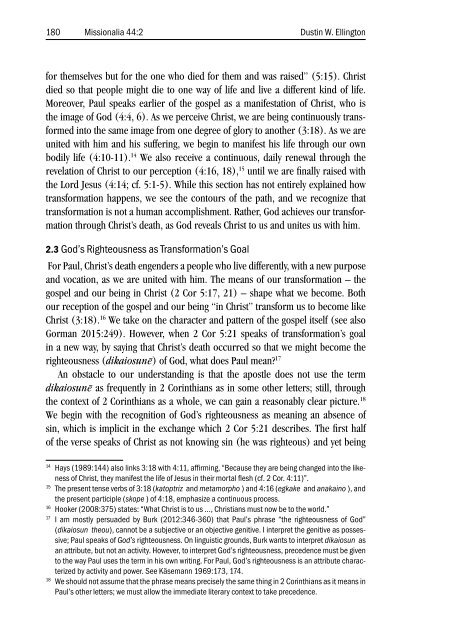Acquiesce to Righteousness
Acquiesce to Righteousness
Acquiesce to Righteousness
You also want an ePaper? Increase the reach of your titles
YUMPU automatically turns print PDFs into web optimized ePapers that Google loves.
180 Missionalia 44:2<br />
Dustin W. Elling<strong>to</strong>n<br />
for themselves but for the one who died for them and was raised” (5:15). Christ<br />
died so that people might die <strong>to</strong> one way of life and live a different kind of life.<br />
Moreover, Paul speaks earlier of the gospel as a manifestation of Christ, who is<br />
the image of God (4:4, 6). As we perceive Christ, we are being continuously transformed<br />
in<strong>to</strong> the same image from one degree of glory <strong>to</strong> another (3:18). As we are<br />
united with him and his suffering, we begin <strong>to</strong> manifest his life through our own<br />
bodily life (4:10-11). 14 We also receive a continuous, daily renewal through the<br />
revelation of Christ <strong>to</strong> our perception (4:16, 18), 15 until we are finally raised with<br />
the Lord Jesus (4:14; cf. 5:1-5). While this section has not entirely explained how<br />
transformation happens, we see the con<strong>to</strong>urs of the path, and we recognize that<br />
transformation is not a human accomplishment. Rather, God achieves our transformation<br />
through Christ’s death, as God reveals Christ <strong>to</strong> us and unites us with him.<br />
2.3 God’s <strong>Righteousness</strong> as Transformation’s Goal<br />
For Paul, Christ’s death engenders a people who live differently, with a new purpose<br />
and vocation, as we are united with him. The means of our transformation – the<br />
gospel and our being in Christ (2 Cor 5:17, 21) – shape what we become. Both<br />
our reception of the gospel and our being “in Christ” transform us <strong>to</strong> become like<br />
Christ (3:18). 16 We take on the character and pattern of the gospel itself (see also<br />
Gorman 2015:249). However, when 2 Cor 5:21 speaks of transformation’s goal<br />
in a new way, by saying that Christ’s death occurred so that we might become the<br />
righteousness (dikaiosunē) of God, what does Paul mean? 17<br />
An obstacle <strong>to</strong> our understanding is that the apostle does not use the term<br />
dikaiosunē as frequently in 2 Corinthians as in some other letters; still, through<br />
the context of 2 Corinthians as a whole, we can gain a reasonably clear picture. 18<br />
We begin with the recognition of God’s righteousness as meaning an absence of<br />
sin, which is implicit in the exchange which 2 Cor 5:21 describes. The first half<br />
of the verse speaks of Christ as not knowing sin (he was righteous) and yet being<br />
14<br />
Hays (1989:144) also links 3:18 with 4:11, affirming, “Because they are being changed in<strong>to</strong> the likeness<br />
of Christ, they manifest the life of Jesus in their mortal flesh (cf. 2 Cor. 4:11)”.<br />
15<br />
The present tense verbs of 3:18 (ka<strong>to</strong>ptrizō and metamorphoō) and 4:16 (egkakeō and anakainoō), and<br />
the present participle (skopeō) of 4:18, emphasize a continuous process.<br />
16<br />
Hooker (2008:375) states: “What Christ is <strong>to</strong> us …, Christians must now be <strong>to</strong> the world.”<br />
17<br />
I am mostly persuaded by Burk (2012:346-360) that Paul’s phrase “the righteousness of God”<br />
(dikaiosunē theou), cannot be a subjective or an objective genitive. I interpret the genitive as possessive;<br />
Paul speaks of God’s righteousness. On linguistic grounds, Burk wants <strong>to</strong> interpret dikaiosunē as<br />
an attribute, but not an activity. However, <strong>to</strong> interpret God’s righteousness, precedence must be given<br />
<strong>to</strong> the way Paul uses the term in his own writing. For Paul, God’s righteousness is an attribute characterized<br />
by activity and power. See Käsemann 1969:173, 174.<br />
18<br />
We should not assume that the phrase means precisely the same thing in 2 Corinthians as it means in<br />
Paul’s other letters; we must allow the immediate literary context <strong>to</strong> take precedence.

















